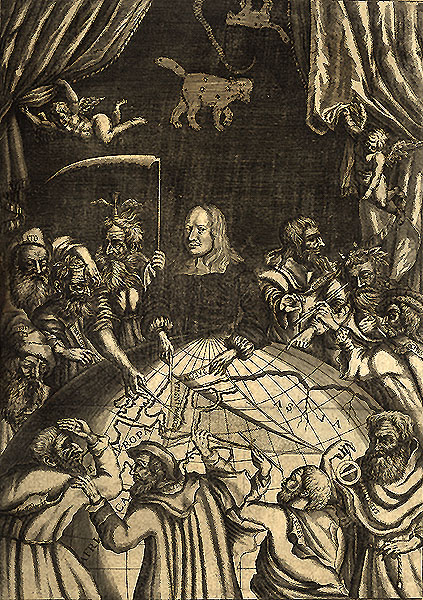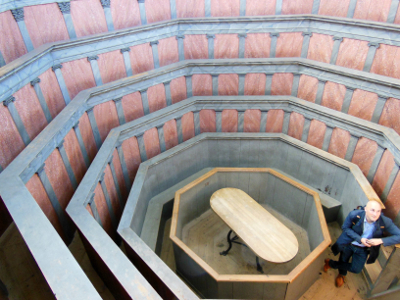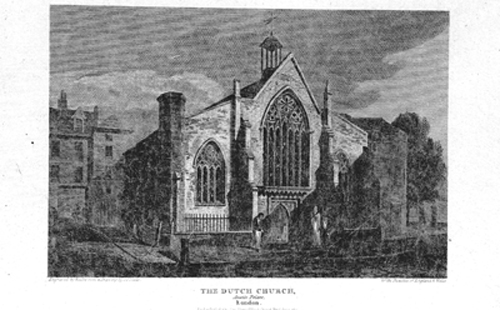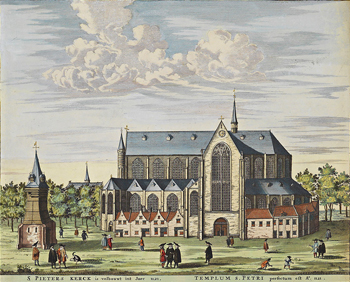It has long been the intention to develop EMLO into a collaborative, scholarly resource, populated by an international community of scholars, research projects, publishers, and repositories, many of whom work on — or curate material relevant to — the history of objects and material culture. If further proof were required that this dream has become reality, we are truly delighted to be announcing today that Dr Bernhard Schirg of the University of Erfurt has received funding from the VolkswagenStiftung to work at the Forschungszentrum Gotha der Universität Erfurt on his innovative project ‘Reaching for Atlantis. The cultural biographies of objects under the Swedish Empire and beyond’. The Fellowship is worth just under one million euros and will last for an initial five years, beginning this coming March when the Research Centre moves into its new premises in the heart of historic Gotha.

Illustration from ‘Atlantica’ [‘Atland eller Manheim’] showing Olof Rudbeck revealing the truth about Atlantis to his classical predecessors. (Source of image: Wikimedia Commons)
Using primary sources as diverse as Latin dissertations, travel journals, and letters, Dr Schirg will create a digital archive to combine both contemporary and subsequent contextualization of individual objects, recording images as well as textual documentation for items that may no longer be extant. As a result of his collaboration with EMLO, he will have at his disposal the full range of epistolary and prosopographic collation tools developed here in Oxford, and will contribute a catalogue of related correspondence. Dr Schirg will spend a year of the grant period in Oxford, hosted by the Bodleian Libraries. In addition to his work with EMLO, we are in no doubt that these twelve months will provide a truly invaluable opportunity for Dr Schirg to work alongside members of the scholarly and curatorial community at the University’s Museums — including the Ashmolean, the Museum of Natural History, and the Museum of the History of Science — as well as with the many individuals who are engaged at present in the research on the history of science and collecting in the second half of the seventeenth and early eighteenth centuries.

Dr Bernhard Schirg in the anatomical theatre, Uppsala. (Source of image: Dr B. Schirg)
With such a focus on the cultural biographies of unique objects, texts are of crucial importance. Equipped with a PhD in neo-Latin philology, Dr Schirg will bring together early modern Latin source material with various forms of documentation in vernacular languages. In recent years, he has expanded his research across disciplines, encompassing art history and the history of science, and has extended his range of periods from the Italian Renaissance to the Scandinavian baroque (a particularly exciting field in the decades around 1680 when Sweden was a central player not only in European politics, but also in academia). Dr Schirg reports that he has found the support his proposal received from Oxford institutions and scholars to be ‘overwhelming’ and that ‘it was highly encouraging to witness the deep interest in my approach as well as the will to establish interdisciplinary collaborations’.
We are delighted at EMLO to be working with Dr Schirg and, together with the University’s libraries, museums, and scholarly community, we hope to help foster ‘a research project that will transcend conventional boundaries of disciplines, and sound out the impact which the national narratives and scientific paradigms of the Swedish Empire exerted on an international level’. If, as Dr Schirg intends, ‘classical and nordic mythology, Scandinavian philology, travelling objects and their various interpretations in early modern letters, dissertations and travel journals’ are highlighted and recombined in the course of this innovative work, then we are indeed in for an ‘inspirational year of vibrant exchange and new encounters’!


